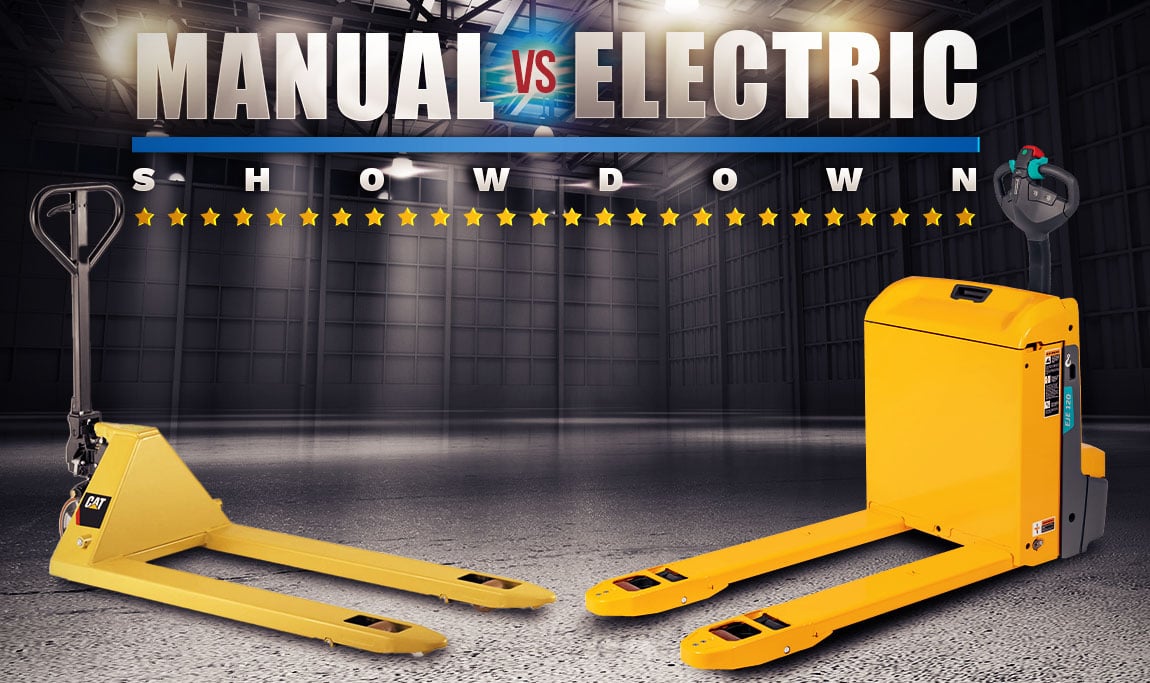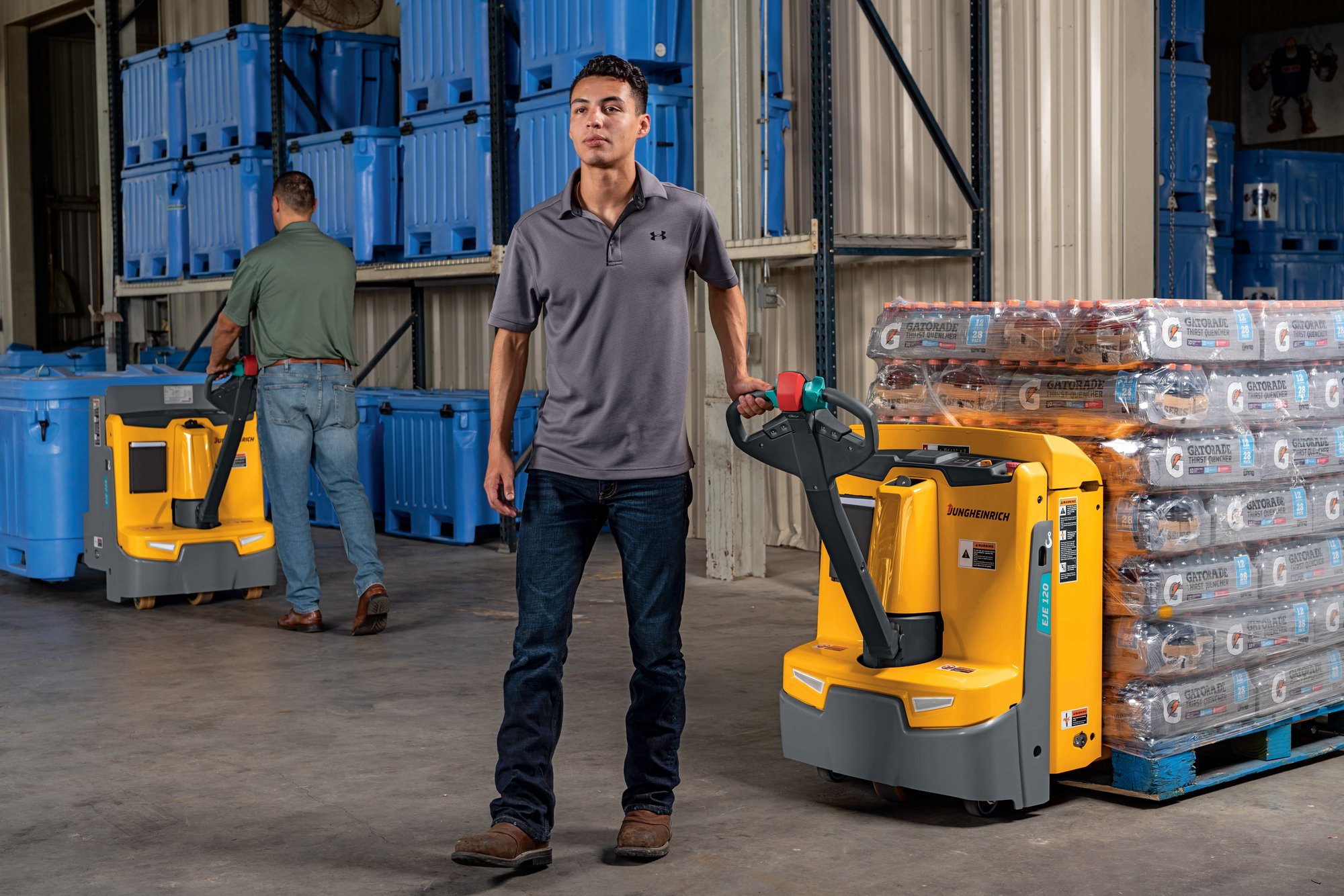
A pallet jack, also called a pallet truck, lifts and moves pallets of goods around a distribution center, warehouse, or industrial facility. They are available in manual or electric operation, each of which has its own advantages. Read on to learn about the key differences between these two types of pallet jacks and determine which is better suited for your workplace.
Differences Between Manual and Electric Pallet Jacks
Manual and electric pallet jacks have different uses and abilities around a warehouse, storeroom, or factory. Consider these factors when it comes time to make a purchase decision.
Power
Naturally, the primary difference between these pallet jacks is how they are powered. A manual jack is controlled by manual operation, while an electric pallet jack is powered by a motor.
The manual pallet jack has a small handle that lifts and lowers the forks, and as the handle is pulled, a lever releases hydraulic fluid to raise the forks slightly to lift a pallet a few inches above the floor. Some manual pallet jacks have an alternative design with a foot pump, as opposed to a handle, for operating the hydraulics. Manual pallet jacks rely on the operator's personal strength to move, requiring more physical labor.
In contrast, the motor does all the work with an electric pallet jack. Electrical power is used to lower and raise the forks, as well as propel the pallet jack forward or backward. Many electric pallet jacks use lead acid or absorbed glass mat batteries, and there are now models that are powered by lithium-ion batteries. Pallet jacks with lithium-ion batteries are typically lighter and take less time to fully charge.
Maneuverability
Manual pallet jacks are good for operating in tight spaces and smaller storage areas because they have a shorter head length than electric models. However, electric pallet trucks offer the assistance of the motor to help the operator easily maneuver a load, and many electric models have a small turning radius so they can be used to unload trailers.
Load Capacity & Travel
Generally, manual and electric pallet jacks can lift anywhere from 2,000 to 10,000 pounds, depending on the model, and are great options for spaces that cannot accommodate large, bulky forklifts.
Since a manual pallet jack requires the operator to push or pull the load without the help of a motor, moving heavier pallets is strenuous on the operator and can lead to fatigue or injury. But an electric pallet jack is able to carry heavier loads than manual models. If your warehouse requires heavier pallets to be lifted and transported from one area to another, then the electric jack is a better choice.
You will also want to think about the travel distance of your pallets. Usually, manual pallet jacks are more suitable for moving lighter product loads up to 40 feet. On the flip side, when you manage a large warehouse or distribution center and your operators need to move products across longer distances, the electric pallet jack is the better option.
Cost
The manual pallet jack is a grab-and-go piece of equipment. It requires little maintenance with minimal up-front costs and is a good choice for a smaller budget. Since they are more complex machines, electric pallet jacks have a higher up-front cost. Plus, you may need to purchase additional batteries and a charger to power the motor.
It’s important to also consider the long-term costs and value of your pallet jacks. Manual pallet jacks have a lower immediate cost and do not require as much maintenance throughout their life. Electric pallet jacks, however, facilitate much higher productivity, can operate in a wider area and with heavier loads, and result in fewer injuries and workers compensation claims.
Certification
Manual pallet jacks require some on-the-job training, such as teaching the operator to push the pallet jack rather than pull it. However, manual pallet jacks do not require any specialized certification from the Occupational Safety and Health Administration (OSHA).
With electric pallet jacks, operators need to be trained and licensed to use them, per OSHA regulations. These pallet jacks are similar to a forklift and classified in the same category as “powered industrial trucks.”
To get certified, operators must participate in an electric pallet jack safety class and then pass a written exam and final evaluation. Since these pieces of equipment have motors, they can easily cause an accident. Proper training ensures that the operator understands how to operate the machine and take precautions to avoid accidents. While it's not difficult to use an electric pallet jack, it does take knowledge and skill to do so safely.
Benefits of Manual and Electric Pallet Jacks
Manual Pallet Jack Benefits
- Easier to use without the need for extensive training
- Cheaper than an electric forklift
- Fewer up-front costs and lower maintenance needs
- Easier to store and move in tight spaces
Electric Pallet Jack Benefits
- Better performance, strength, and lifting capabilities
- Faster to operate and less likely to cause injuries
- More ergonomic and puts less strain on operators
- More suitable option for facilities with higher-volume operations
- Proper training can ensure easier operation
- Can operate better and faster in large facilities that require transporting pallets across longer distances
Which One Is Right for You?
Manual pallet jacks are more affordable and can handle moving pallets in tight spaces. They don’t require charging and are ready to go at all times. But if you want better performance and heavier lifting capabilities for your warehouse, retail store, or distribution center, then the electric pallet truck is a better choice for your business. If you run a larger warehouse or high-volume operation, they’re ideal for moving pallets without fatiguing your operators, and their elevated design and training requirements mean a decrease in accidents.
Need More Information About Pallet Jacks?
Manual and electric pallet jacks each have their own clear advantages. When you need to choose the ideal pallet jack for your facility, our Equipment Depot team is ready to answer your questions. Talk to one of our experienced consultants by calling 888.EQDEPOT today to learn more or get immediate delivery of our in-stock units.


